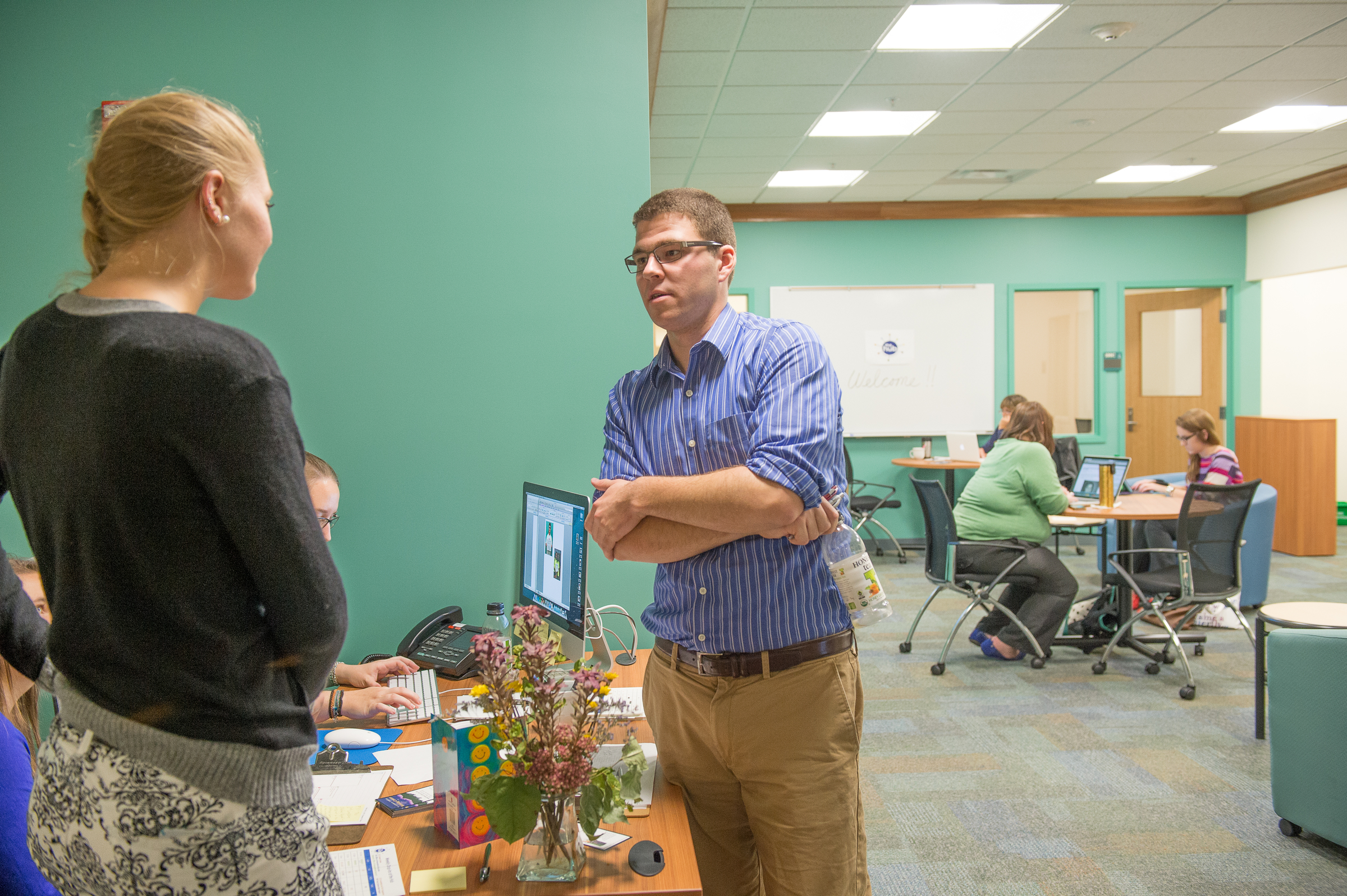
Students meet with career peer mentors and counselors at the new Career Hub in the Davis Center at the University of Vermont. (Kirk Carapezza/WGBH)
It’s the perennial question that college seniors get around this time of year as they count down the days to graduation: “Do you know what you’re going to do yet?”
While some students may be all set with a job, others are at a loss.
As more people question the value and cost of higher education, and President Barack Obama calls for a federal college-rating system that would measure job and income-related outcomes, many colleges and universities are responding to the pressure by beefing up their career centers.
There are still five months until summer break, but sophomore Michaela O’Flaherty finds time to drop by the University of Vermont’s new career hub, seeking advice. O'Flaherty, from Newton, doesn't know what she wants to do when she graduates. But she knows one thing.
"I definitely don’t want to come out of college and not have a job and have to move back in with my parents,” she said.
It's something most college students dread.
They’ve heard the horror stories from their older friends and from the media: More than half of recent graduates are unemployed or underemployed. With the cost of college soaring, more and more students are demanding a return on investment. And administrators like UVM's career director Pamela Gardner say they're responding.
“When a student comes here, they know what they need to do to earn a degree," Gardner said. "They don’t know what they need to get a job.”
To give students a better idea, this year UVM built its new career center in the middle of campus. Right next to the grilled cheese sandwich stand, you really can't miss it.
"This corridor is probably the most trafficked indoor corridor in the institution," Gardner said. "Part of the issue is we’ve had most of these programs and services all along. It's how well have the students known about them and how will they access them."
At a time when the cost of college is going up and family incomes are stagnating, Gardner is plugging a four-year plan for career success. She says it begins freshman year.
"If we’re going to prepare students to walk into a world of work that’s much more complicated than it was, then we need to get them started when they’re fresh on campus," Gardner said. They need to have a road map.”
In addition to building a new career hub, UVM has hired five career service staffers to help students find internships and eventually jobs. UVM isn't alone. In Massachusetts, many schools competing for students' tuition dollars have expanded their career services on campus and online.
It's become a major selling point. Amy Murphy, director of career planning at the College of the Holy Cross in Worcester, says before the Great Recession job placement was a value-add. Now, higher-ed institutions see it as an obligation to their students.
"To round out their academic experience, and support them in finding opportunities to try out the skills they develop in the classroom in a work environment," Murphy said.
These efforts are long overdue, says Ohio State University economist Richard Vedder.
“I think we’re doing a horrible job of preparing students for the job market," said Vedder, who directs the Center for Affordability and Productivity at Ohio State. "I think it’s almost immoral.”
Vedder thinks there’s a huge mismatch between the training kids find in college and the kind of jobs they actually get: Too many students are graduating from college and ending up in jobs that have historically been filled by high school graduates.
"We are sending a lot of people down the primrose path," he said. "We’re getting their expectations high that they will have a ticket to a middle-class life, graduating from college, no matter what they do in college, and that’s simply not true.”
It's leaving many families skeptical about higher education in general and the liberal arts in particular. Colleges are increasingly defending their value and quality in the global marketplace.
"Educators and employers actually have a high degree of agreement on what constitutes a really good education," said Carol Schneider, president of the Association of American Colleges and Universities. She says educators have spent a lot of time soul searching, asking themselves what kind of experience students really need to thrive in today's workforce.
"Educators want students to write better," Schneider said. "Employers want students to write better. Educators know they need to do a better job of critical inquiry and problem solving so that all students can really do that. Employers want exactly the same thing."
Back at UVM, O’Flaherty has just declared her major: philosophy. Now, she's trying to line up a summer gig — something paid would be ideal.
"The major I chose doesn’t lead to a direct career path, so I think making connections with people in Burlington or Boston is really going to help me find out what I want to do,” she tells her counselor. "I'll probably ask for a shadow day."
O'Flaherty wraps up her meeting with a career coach. Then she heads back to the library, a bit more hopeful that her education will pay off.










